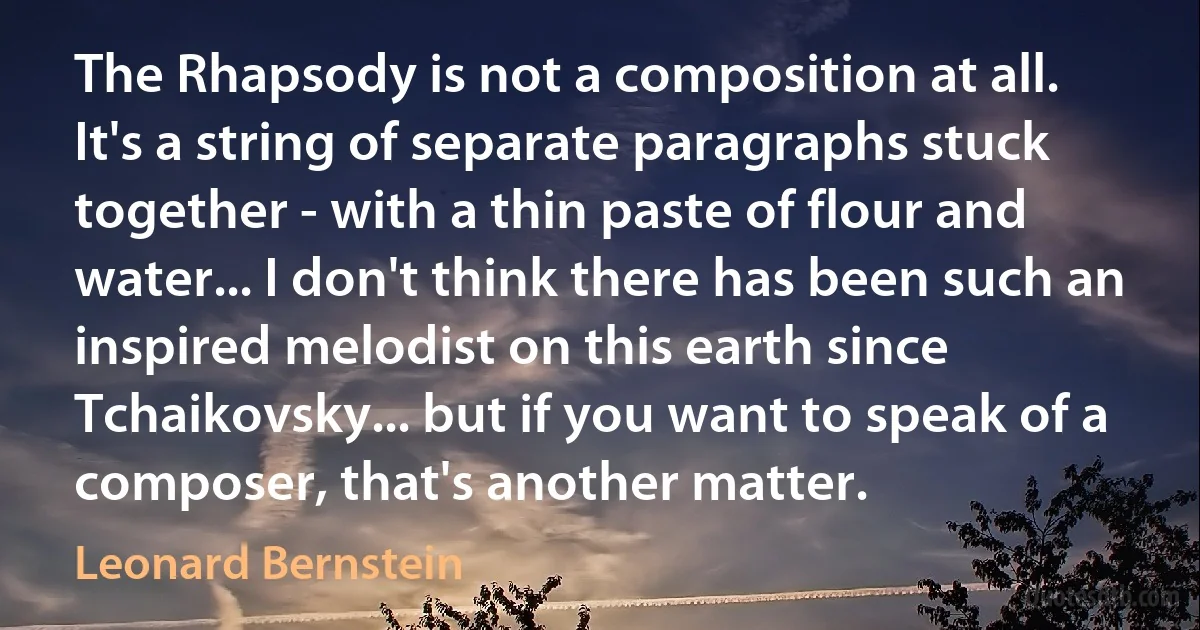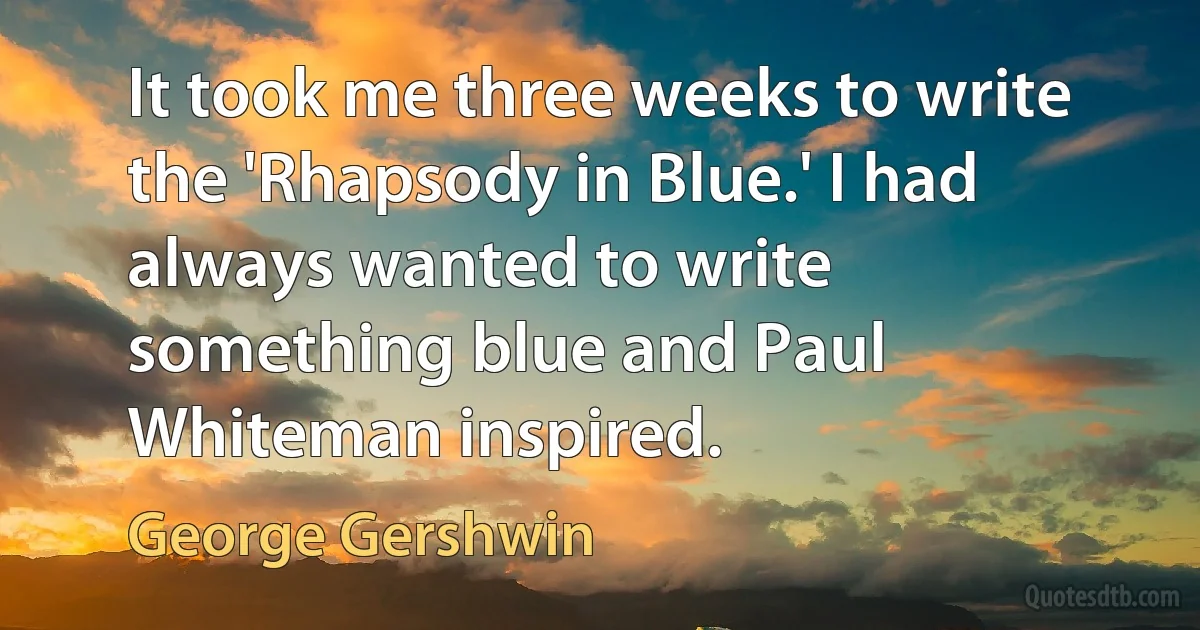Rhapsody Quotes
Cultures have long heard wisdom in non-human voices: Apollo, god of music, medicine and knowledge, came to Delphi in the form of a dolphin. But dolphins, which fill the oceans with blipping and chirping, and whales, which mew and caw in ultramarine jazz - a true rhapsody in blue - are hunted to the edge of silence.

Jay Griffiths
Yet with every allowance, one feels it difficult to see how any mortal ever could consider this Koran as a Book written in Heaven, too good for the Earth; as a well-written book, or indeed as a book at all; and not a bewildered rhapsody; written, so far as writing goes, as badly as almost any book ever was!

Thomas Carlyle
Home from Guatemala, back at the Waldorf.
This arrival in the wild country of the soul,
All approaches gone, being completely there,
Where the wild poem is a substitute
For the woman one loves or ought to love,
One wild rhapsody a fake for another.You touch the hotel the way you touch moonlight
Or sunlight and you hum and the orchestra
Hums and you say "The world in a verse,A generation sealed, men remoter than mountains,
Women invisible in music and motion and color,"
After that alien, point-blank, green and actual Guatemala.

Wallace Stevens
He [Gilels] played in an easy, natural manner, with strong but unassuming musicianship. His technique was brilliant; years later Neuhaus, still astonished, was to recall Gilels's incredible octaves in Liszt's Spanish Rhapsody. Yet Gilels was never looked upon as a mere virtuoso. As a matter of fact, his programs did not often include music pour epater le bourgeois. He played a stedy diet of Beethoven (the Hammerklavier was a work that strongly engaged his last years), Schubert, Schumann, Chopin and Brahms. In many respects, the great virtuoso who put his authoritative stamp on whatever he played was, at the same time, a thinking man's pianist.

Emil Gilels
Well, if I were thus rationed in this article and could have but one adjective for George Gershwin, that adjective would be "ingenuous." Ingenuous at and about his piano. Once an occasional composer named Oscar Levant stood beside that piano while those sure, sinewy, catlike Gershwin fingers beat their brilliant drum-fire-the tumultuous cascade of the "Rhapsody In Blue," the amorous languor of "The Man I Love," the impish glee of "Fascinating Rhythm," the fine, jaunty, dust-spurning scorn of "Strike Up the Band." If the performer was familiar with the work of any other composer, he gave no evidence of it. Levant (who, by the way, makes a fleeting appearance in the new Dashlell Hammett book, under the guise of Levi Oscant) could be heard mutterIng under his breath, "An evening with Gershwin Is a Gershwln evening."
"I wonder," said our young composer dreamily, "if my music will be played a hundred years from now."
"It certainly will be," said the bitter Levant,"if you are still around."

Alexander Woollcott
The thing that will never go away is that connection you make with a band or a song where you're moved by the fact that it's real people making music. You make that human connection with a song like 'Let It Be' or 'Long and Winding Road' or a song like 'Bohemian Rhapsody' or 'Roxanne,' any of those songs. They sound like people making music.

Dave Grohl
Whatever became of Kurt Schwitters' novel 'Franz Müllers Drahtfrühling' [Franz Müller's Wire Spring] several chapters of which we composed together? Is it buried under the bomb ruins of his house on Waldhausenstrasse in Hannover? For hours, Schwitters and I sat together and spun dialogue, in rhapsody. He took these writings and channeled them into his novel...We sat together again, writing 'Franz Müllers Drahtfrühling':
H. A.: The nightingales have had enough of your hymnal Karagösen. Play violin on parrots, but avoid the women red hood ans snow widow.
K. Schw.: Should I pe-trify something for you? Or would you like play cry together?
H. A.: Should we wash our tears or drown them?
K. Schw.: You are a sipsnipper, Since when do your diamonds bark?
H. A.: The water is getting hard. A fruit cries out loud and gives birth to a fish.
K. Schw.: I'll p-ut it in the sea, or should I st-ab you with it?

Jean Arp
Well, if I were thus rationed in this article and could have but one adjective for George Gershwin, that adjective would be "ingenuous." Ingenuous at and about his piano. Once an occasional composer named Oscar Levant stood beside that piano while those sure, sinewy, catlike Gershwin fingers beat their brilliant drum-fire-the tumultuous cascade of the "Rhapsody In Blue," the amorous languor of "The Man I Love," the impish glee of "Fascinating Rhythm," the fine, jaunty, dust-spurning scorn of "Strike Up the Band." If the performer was familiar with the work of any other composer, he gave no evidence of it. Levant (who, by the way, makes a fleeting appearance in the new Dashlell Hammett book, under the guise of Levi Oscant) could be heard mutterIng under his breath, "An evening with Gershwin Is a Gershwln evening." "I wonder," said our young composer dreamily, "if my music will be played a hundred years from now." "It certainly will be," said the bitter Levant,"if you are still around."

George Gershwin
Whatever became of Kurt Schwitters' novel 'Franz Müllers Drahtfrühling' [Franz Müller's Wire Spring] several chapters of which we composed together? Is it buried under the bomb ruins of his house on Waldhausenstrasse in Hannover? For hours, Schwitters and I sat together and spun dialogue, in rhapsody. He took these writings and channeled them into his novel...We sat together again, writing 'Franz Müllers Drahtfrühling':.

Jean Arp


